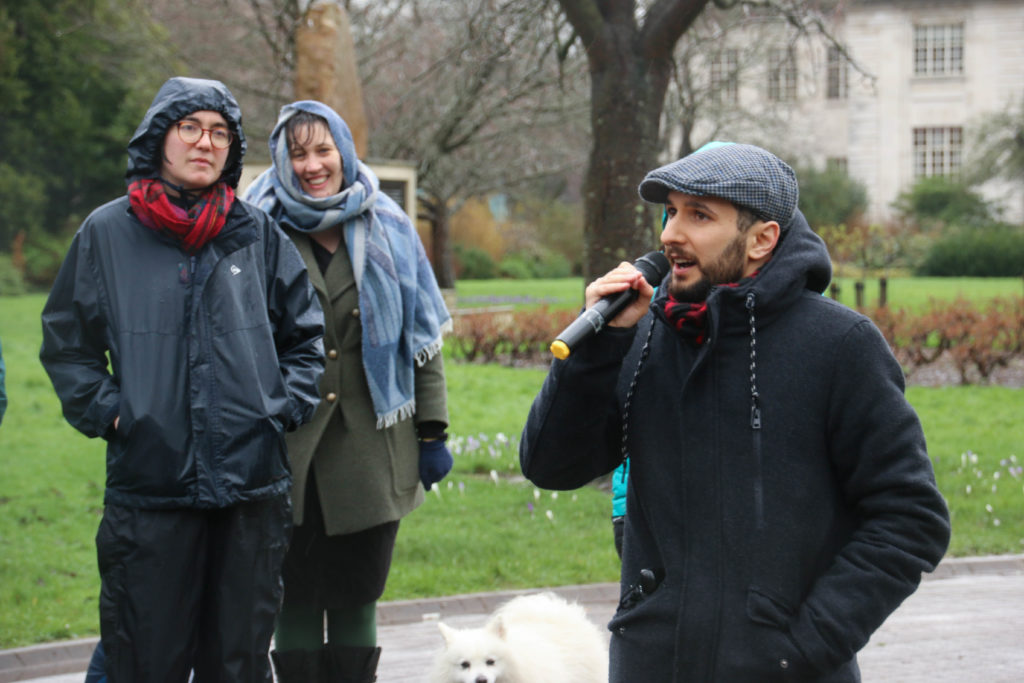Marketized higher education is eroding teaching staff’s job benefits, while the industrial action is disrupting students’ learning experience.

Cardiff University staff have joined lecturers at 74 UK universities, in the second round of strikes to call for an end to precarious contracts and excessive workload.
A survey in 2017 showed that nearly half of Cardiff University staff have to work extra hours to meet job requirements. According to Cardiff branch of the University and College Union (Cardiff UCU), 38% of Cardiff University staff said they feel secure, and 52% of those employed hold zero-hours or fixed-term contracts.
Among the teaching staff, PhD students are the most exploited group. “We’re willing to take on those sorts of contracts,” said Henry Morgan, a third-year PhD student from Cardiff University School of Music. “It’s just a workforce being taken advantage of.”

Jason Roberts, a PhD student teaching research methods at Cardiff School of Journalism, Media and Cultural Studies (JOMEC), said many of his work, such as providing guidance and answering e-mails were out of the contract hours and unpaid.
“The graduate tutors are paid versus the way that they are expected to,” said Jason.
The casual contract sparks an uncertain future for teaching staff. “If you want to get a house and have a family in the area where you live, you can’t do that because the bank won’t give you a mortgage,” said Andy Williams, the media spokesperson of Cardiff UCU.
“Because you’ve only got a year’s employment and you might be out of a job next year, so you have zero security for planning and living your lives.”
“Precarity and uncertainty into the future income is a major factor that has an impact on my research,” said Henry. He has two part-time teaching jobs at Cardiff University. To fund his study, he is trying to grab as much casual employments as he can.

Besides that, the heavy workload is driving PhD students away from their research. “The time management of working in the education sector is always going to be tricky, ” said Henry. “That’s not something that can change overnight but that has a big impact when you’re expected to keep all the plates spinning.”
Teaching a module of 70 students, Henry had to mark their essays in two weeks. It took him around 45 minutes marking an essay, but the time could be longer if reflection and moderation were taken into account. He said he couldn’t do any research work while marking students, as the process must be done in a short time according to the contract.
“All these different part-time jobs are coming together to build something completely precarious. You know, it’s a house of cards in itself, ” said Henry. “If they would all fall through at the same time, I would be utterly incapable of continuing (PhD study).”
Teaching staff holding full-time contracts are working extra hours as well.
“The amount of forms we have to fill out on top of our normal work has mushroomed in the last 10 years. We have to do more paperwork because universities want to get higher in the league tables,” said Andy Williams.
Along with heaps of administrative paperwork, Mr Williams has to tackle the doubled class size.
Two in five 18-year-olds in the UK along with record numbers of international students applied for places to study at university this year according to The Guardian‘s report. UK universities are accused of its marketized education, recruiting more students rather than lecturers, lifting tuition fees but running the live stream to teach students. The lecture halls are overspilled in prestigious universities, which means the lecturers have to work overtime to guarantee the learning outcome of students.

“I have to work a lot of evenings, have to work a lot of weekends. I don’t have that time where I’m not being paid to spend with my family, to have a private life. This is just wrong,” said Mr Williams.
He added that the strike might continue for more waves if Vice-Chancellors don’t give an offer, which will have a disruptive impact on students.
A leaked email from Cardiff University Students’ Union (SU) president Jackie Yip suggests that some student would not able to graduate due to the strike action, but doesn’t tell the scale. Responding to Gair Rhydd, a Cardiff student-run newspaper, Jackie Yip said that SU is lobbying to bring an end to the strike with a good result for all parties involved.
James Wallice, a second-year undergraduate at Cardiff University, set up a petition calling for SU to hold an extraordinary general meeting (EGM) to address the strike action.
“Because of strike action, students aren’t receiving the number of contact hours, and therefore they’re not being given the knowledge they need to graduate. I think that’s very poor,” said he.
James said his housemates have already gone home as they found out that there would only be one lecture for the entire week.
“I’ll be putting forward a motion of the EGM that sees the university to protect the interest of every student,” said James. “In this way, the pressure will be put on the university and UCU will ensure that an amicable agreement can be fleshed out quickly. And that’s the key. I want to end the strike action as soon as possible.”
.embed-container { position: relative; padding-bottom: 56.25%; height: 0; overflow: hidden; max-width: 100%; } .embed-container iframe, .embed-container object, .embed-container embed { position: absolute; top: 0; left: 0; width: 100%; height: 100%; }Versus the opposition party, students supporting the strike action said they want a better education sector not only for themselves but for the next generation.
Henry has worked as a bartender for eight years. He said he has seen PhD students who are unable to carry on because of the precarity of working status. “You made that decision and you’re thinking about it every month. Is this worth? Is this viable? Do I have to grit my teeth and get back into the service industry?” He said the sector should be changed to make teaching job more stable.
Jason said he doesn’t want the marketization of universities to evolve. “I might have children one day to go to a university, and I want them to be able to experience a good quality of education. I don’t want them to be seen as customers where essentially they’re turned over in three years.”

